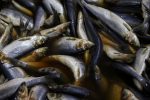Rusip is a fermented foods from Indonesia and especially Bangka and Lampung. It is based on fermented fish alongside the addition of large amounts of salt (10 – 25% final composition), sugar and/or rice (10%). The fish is fermented anaerobically for at least 2 weeks.
Adding salt to such a high level is standard method of preventing the growth of pathogenic bacteria, such as Clostridium. It also increases the rate of fish putrefaction and decay but also alters the taste profile to make it more sour.
The bacteria found in rusip include Streptococcus, Lactobacillus, and Leuconostoc LAB.
References
Yuliana, N., Koesoemawardani D, Susilawaty, Kurniati Y. (2018) Lactic acid bacteria during fish fermentation (rusip). MOJ Food Process Technol. 6 pp. 211–6.

Leave a Reply